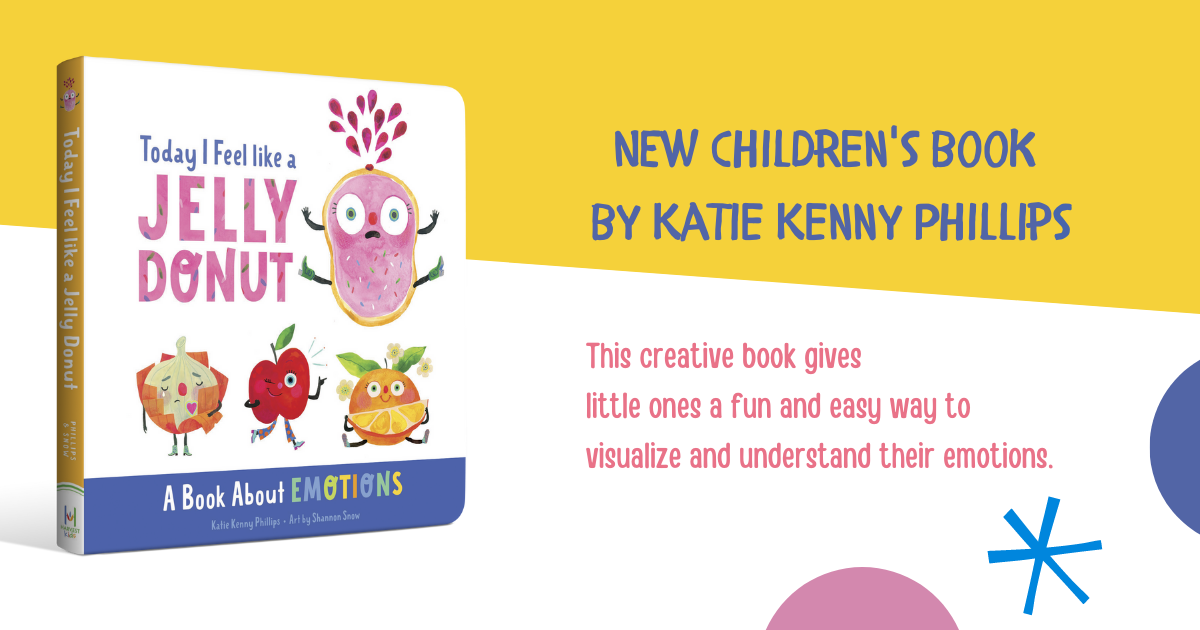4 Easy Ways to Start Helping Kids Understand Their Feelings
A Note from Shaunti: I’m very excited about this guest blog from Katie Kenny Phillips — a long time friend who was also my senior editor for many years. She has recently transitioned into writing amazing children’s books.
I’m very excited to announce the release of her newest book, “Today I Feel Like a Jelly Donut.” This is a GREAT book for those of you who want to help your little ones understand and begin to manage all the emotions swirling inside of them. Enjoy!
Guest Post by Katie Kenny Phillips
As a mom of five kids (and raising two of them from trauma out of foster care,) I’m pretty sure I’ve seen almost every emotion under the sun. There’s not much that shocks me anymore because I’ve nearly witnessed it all – highs, lows, grumpiness, anger, silliness, fear, shame, joy. And because human behavior resulting from big feelings doesn’t necessarily tell the whole story (hangry people unite!), I’ve learned that it’s important to be curious about our kids’ feelings – and even our own – if we are to better interact with each other.
No one is surprised that a lot of kids are experiencing elevated levels of anxiety and stress. Just look at the last several years with a pandemic, virtual learning, social and political unrest, the list goes on. Adults are feeling those things too! But thankfully, we are now more open to discussing mental health struggles when it comes to ourselves and our children.
The time is now to help our kids understand their emotions and for us to be able to openly talk to them about their feelings, fears, and anxieties. And when they become well-versed in understanding their emotions, studies are finding there are long term benefits for them such as having better mental health, stress management skills, conflict resolution skills, more responsibility, and resiliency.
But where to begin?
1. Let’s help our kids stop and think about their feelings.
Doesn’t it sometimes seem like kids operate on 3 settings: happy, angry, and unconscious? But kids feel all the emotions, and when they’re little, they don’t often know the difference between being tired and mad, nervous and angry, ashamed and upset, frustrated and furious. If we’re honest, sometimes we don’t know the difference when we’re feeling similarly!
I know I’ve had so many moments when a child has been melting down and it’s been helpful to verbalize, “Hey, you sound upset and angry.” Or “You sound scared right now.” Or “Let’s take a deep breath because you sound so excited your words are rushing together.” Putting words to what must seem like a flurry of yelling, crying, stomping, or fussing helps kids put a name on the mysterious thing going on inside their bodies.
2. Let’s help our kids become curious about what they are feeling.
When we ask our kids to stop and think about what emotion they are feeling, it’s a good opportunity for them to become curious about what led them there. I’m always asking my kids to be a detective, whether it’s with finding something they’re looking for or looking for clues as to why they are angry, upset, sad, etc.
When a child realizes they can pinpoint the moment leading to their emotion, it may not change the feeling (mad/sad/jealous), but it will give them the emotional intelligence to say, “I started feeling upset when my friend said they wouldn’t play with me any more today. It made me feel sad.” Or “My teacher thought I broke a toy at school today, but I didn’t. I feel upset that she didn’t believe me.”
Stretching that emotional intelligence muscle will help them as they mature and start them on the path to becoming a lifelong learner of their own – and other people’s – emotions and behavior.
3. Let’s help our kids by validating their feelings.
It doesn’t do anyone any good to tell someone to stop feeling what they’re feeling. Or to tell them what they should be feeling. For example, how many of you have successfully calmed down when someone told you to calm down? Doesn’t it make you furious?
It’s important when kids are having big feelings to validate them. Acknowledge the fact that you understand why they are upset or sad or frustrated. Starting by validating their feelings can help them feel understood, even if the next step is helping them figure out what to do about it. It goes a long way to tell an embarrassed child, “I totally get why you felt embarrassed being asked to speak in front of your class. That happens to me at work too. It makes my cheeks and ears hot, and my stomach feels nervous. Let me tell you what I do when that happens to me.” Or “I understand why you’re crying and sad about not getting to watch TV anymore today. I get that feeling. I love TV, too!”
4. Let’s help our kids take their feelings to God.
Ultimately, we want our kids to know that God made them, and He loves every bit of them – including the big and the small feelings! It’s a great opportunity to point our kids to Jesus and say, “let’s ask God to help you when you feel sad. He’s always with you and wants you to know He’s here for you when you’re sad or happy or anything in between.”
We can also help guide kids to take their joy, happiness, gratitude, contentment, etc. to God as a way to praise Him. “Let’s thank God for this happy day!” Whatever they are feeling, God wants to know about it, and loves them no matter what emotion they are experiencing.
Emotions can be complicated. But they are also normal and valid and worth understanding. As we help our kids mature in their emotional intelligence (ok, and as we also mature), looking deeper at all of our feelings will help us maintain connection. With each other, and with the wonderful, creative, loving God who made us.
Katie Kenny Phillips is a mom of 5 and a children’s author who loves helping kids (and their grownups) see God’s love for them with fresh eyes. Her books are available on Amazon including her book, Today I Feel Like a Jelly Donut, a Book About Emotions. Whether they are excited like popcorn, sad like an onion, or so nervous they could crack like an egg, kids will have a fun and easy way to visualize and understand their emotions. And most importantly, discover that no matter the mood, no matter the food, God loves them just the way they are! You can also visit her on her website or follow her on Instagram.
If you are interested in having Shaunti bring research-based strategies, practical wisdom and biblical principles to your next event, please contact Nicole Owens at [email protected].
On our podcast, I Wish You Could Hear This, Jeff and I offer proven steps to help you thrive in your life, faith and relationships. In other words, we’ll offer the practical help you’ve grown accustomed to right here in this blog space. You’ll take away specific steps that help you today. Listen, follow, and share with your friends on YouTube, Apple Podcasts, Spotify and other platforms.
Please note: This post may contain affiliate links. As an Amazon Associate we earn a small amount from qualifying purchases through these affiliate links. This doesn’t cost you anything, and helps us continue bringing you great content!







